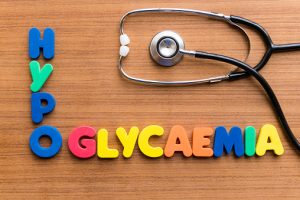 Nocturnal hypoglycemia, or low blood sugar at night, is a risky nighttime diabetes complication which diabetics should be aware of. Hypoglycemia (hypo) refers to low blood sugar. After we consume a meal our body absorbs glucose – this is what provides us with energy. When we consume more sugar than our bodies needs it can become stored in our muscles and liver. Our liver and muscles release the storage supplies when our blood sugar begins to drop.
Nocturnal hypoglycemia, or low blood sugar at night, is a risky nighttime diabetes complication which diabetics should be aware of. Hypoglycemia (hypo) refers to low blood sugar. After we consume a meal our body absorbs glucose – this is what provides us with energy. When we consume more sugar than our bodies needs it can become stored in our muscles and liver. Our liver and muscles release the storage supplies when our blood sugar begins to drop.
In healthy individuals this release of glucose brings our blood sugar back up, but if it continues to fall, then it becomes hypoglycemia. Hypoglycemia can also be a side effect of diabetes medication. Even if you’re not diabetic, other medications can contribute to hypoglycemia as well.
Advertisement
Hypoglycemia can have negative effects on the body as sugar is so essential for many bodily functions. Effects of low blood sugar on the body include:
- Changes in heartbeat
- Mood changes
- Dizziness
- Headache
- Sleep disturbance
- Clumsiness
- Hunger
- Foggy thinking
One-third of diabetics fail to report to doctors about nighttime hypoglycemia
 New research suggests that one-third of diabetics fail to report to their doctors about nighttime hypoglycemia. Nighttime hypoglycemia is a common complication of diabetes, but if left untreated, it can contribute to worsened health consequences.
New research suggests that one-third of diabetics fail to report to their doctors about nighttime hypoglycemia. Nighttime hypoglycemia is a common complication of diabetes, but if left untreated, it can contribute to worsened health consequences.
Nighttime hypoglycemia can contribute to time away from work, loss of daytime productivity and a reduced desire for socializing and exercising, which can be detrimental to health. Nighttime hypoglycemia can affect a person’s sleep and can increase their risk of injury; if they become unsteady on their feet, it can contribute to falls.
Professor Anthony Barnett from the University of Birmingham said, “It is concerning that some patients are not reporting night-time hypos to their doctor or nurse, given the impact on their long-term health and lifestyle. People with diabetes who are experiencing either day or night-time hypos are encouraged to speak to their doctor or nurse to ensure that they are being appropriately managed.”
An acronym has been developed for diabetics to be able to open up and talk to their doctors about hypoglycemia. The acronym is TALK and it refers to:
Think: Do you know what hypo is? Do you suffer form hypo?
Ask: Ask your doctor about hypos.
Learn: What can be done to better manage hypo episodes or reduce them?
Keep: Keep track of your discussions with doctors and nurses.
Director of Health Intelligence at Diabetes UK, Simon O’Neil, said, “We encourage all people with diabetes to remember the simple TALK Hypos message and to take steps to better manage their day- and night-time hypos. These steps can include simple changes to lifestyle, diet and treatment so it is very important to discuss hypos as part of the regular consultation with your doctor or nurse.”
Signs of nighttime hypoglycemia (low blood sugar)
Hypoglycemia can occur at any time of the day, but it can be quite harmful for diabetics to experience it at night. Mild to severe daytime symptoms of hypoglycemia include:
- Sweating
- Nervousness, shaking
- Weakness
- Extreme hunger
- Dizziness and headache
- Blurred vision
- Rapid heartbeat
- Inability to concentrate
- Confusion or irritability
- Muscle twitching
- Personality changes
The above symptoms can occur in nighttime hypoglycemia and may also include:
- Restlessness
- Attempting to get out of bed, accidentally rolling out of bed
- Sleepwalking
- Nightmares
- Sweating
- Waking up with a headache
Ways to prevent hypoglycemia at night
 To avoid complications related to nighttime hypoglycemia, try these tips to prevent it from occurring.
To avoid complications related to nighttime hypoglycemia, try these tips to prevent it from occurring.
Check blood sugar prior to bed: By knowing what your blood sugar is prior to bed you can get a gauge of whether or not it is already low or has the potential to drop further. If your numbers are low, you can combat this by having a small healthy snack.
Know the signs of nighttime hypoglycemia: By recognizing the signs of nighttime hypoglycemia – listed above – you can better prepare yourself before it worsens. You want to avoid being abruptly awoken in the middle of night because it can increase your risk of injury, due to dizziness, lightheadedness, etc. – especially if you sleep alone.
Don’t skip dinner: Having a small dinner or none at all can cause even bigger dips in blood sugar. Although you shouldn’t eat too closely to bed because it will disrupt your sleep, a healthy sized dinner at the appropriate time can prevent nighttime hypoglycemia. Opt for foods that have staying power like complex carbohydrates, as opposed to high-sugar foods which will cause your sugar levels to crash.
Avoid excessive exercise at night: Exercise is important for diabetics but not too late in the evening. Late exercise can contribute to drops in glucose in the middle of the night.
Limit alcohol at night: Alcohol can contribute to drops in blood sugar, so drink in moderation and not too close to bedtime. If you do choose to consume alcohol, pair it with carbohydrates to reduce the drop in glucose.
Be prepared: Even with prevention tips drops in blood sugar can still occur, so it’s best to be prepared. Keep healthy snacks on your nightstand so you don’t need to go to the kitchen to retrieve them. If nighttime hypoglycemia is an ongoing problem, speak with your doctor about a change in medications or better diabetes management tips.
Non-diabetes causes of hypoglycemia at night
Even if you’re not diabetic you can still experience nighttime hypoglycemia. Causes of nighttime hypoglycemia in non-diabetics are:
- Medicine
- Too much insulin
- Factitious hypoglycemia – the inappropriate use of insulin and sulfonylurea medicines
- Illnesses and other health conditions: heart failure, liver disease, kidney failure
- Inborn metabolic problems
- Alcohol
- Postprandial hypoglycemia: rapid absorption of glucose one to two hours after a meal
- Pregnancy
- Exercise
Importance of avoiding low blood sugar
Low blood sugar can greatly impact the body as a whole, whether you’re diabetic or not. It is then important to avoid low blood sugar in order to avoid these side effects.
 Heart palpitations or rapid heartbeat
Heart palpitations or rapid heartbeat- Low energy
- Loss of consciousness
- Visual disturbances
- Foggy thinking
- Mood changes
- Headache
- Seizures
- Extreme hunger
- Unsteadiness on feet
- Shakiness
- Tingling or numbness
- Anxiety or irritability
Related Reading:
Hypoglycemia alert: How low is your blood sugar?
Are you feeling shaky and weak? Nervous and sweating for no apparent reason? It could be hypoglycemia – low blood sugar – a symptom, just like fever, that signals something is wrong with your health. Continue reading…
Advertisement
New type-2 diabetes treatment strategy: Lower blood sugar using liver
There are a number of treatments for diabetes including diet, and insulin therapy; however, new research has uncovered a type-2 diabetes treatment involving a way to lower blood sugar using the liver. Continue reading…
Sources:
http://www.news-medical.net/news/20151001/One-third-of-people-living-with-diabetes-fail-to-report-night-time-hypoglycaemia-to-their-doctor-shows-research
http://www.healthline.com/health/low-blood-sugar-effects-on-body
http://www.webmd.com/a-to-z-guides/symptoms-of-low-blood-sugar-topic-overview
http://www.diabetes.co.uk/nocturnal-hypoglycemia
http://www.everydayhealth.com/hs/diabetes-and-insulin-guide/treatment-plan-insulin/preventing-low-blood-sugar-at-night
http://www.diabetes.co.uk/preventing-hypoglycemia
http://www.emedicinehealth.com/script/main
https://www.nlm.nih.gov/medlineplus/hypoglycemia
